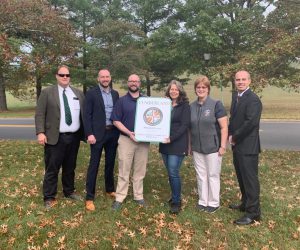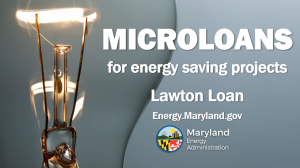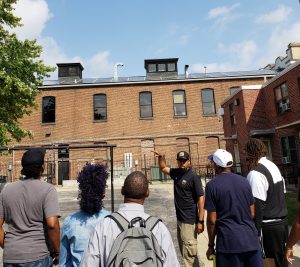Maryland Energy Administration – October News Bulletin – local government focus
Maryland Energy Programs Work for Your City, Town and County
What is at the top of your municipality or county needs list now? The response from most will almost always be additional funding. The Maryland Energy Administration (MEA) hosts several programs that can provide support and funding for eligible energy-related projects that local governments need now. Investing in energy efficiency and sustainability measures can cut monthly bills; freeing up cash that can be deployed by your organization for other needs.
Leading by example – Frederick County
Frederick County has received over $2.6 million in grants from MEA from fiscal years 2016 – 2019 for energy related projects to address energy efficiency, sustainable transportation goals and the low-to-moderate income community. Additionally, local businesses and residents received $1.2 million in grants for projects ranging from commercial energy projects to residential electric vehicle equipment service rebates. Read here about how the county leveraged grants to bring four fully-electric transit buses into service which drastically reduced their fossil fuel costs and eliminated 327,750 pounds of CO2 emissions.
Maryland Energy Administration grant list for Frederick County 2016 to 2019
All incorporated towns, cities or counties in Maryland are eligible to become a Maryland Smart Energy Communities (MSEC), which encourages communities to implement policies that promote energy efficiency, renewable energy, and alternative transportation fuels in their jurisdictions. Past awardees have used their grants to implement cleaner public transportation, install rooftop solar panels, upgrade street lights and more. Total funding for the FY21 program is $1,080,000, for existing MSEC communities as well as new communities. The deadline for submitting applications is November 13, 2020; click to apply now.

Read how Cumberland has partnered with the State of Maryland to realize an additional annual cost savings of $130,000, here.
MSEC members can take advantage of another MEA program to amplify funding via the Jane E. Lawton Conservation Loan (Lawton Loan). The Lawton Loan provides eligible borrowers with loans that typically range from $5,000 – $200,000 to identify and install energy conservation measures and improvements in their facilities. All local governments can take advantage of 0% interest rate on their loan. Additionally, microloans for cost-effective energy efficiency upgrades up to $40,000 with a maximum term length of five years. A total of $2,050,000 is now available, applications available online.
The Combined Heat & Power (CHP) grant is for CHP systems that generate electricity while capturing waste heat in order to maximize energy efficiency, reduce waste and offer cleaner, more resilient energy to critical infrastructure facilities like hospitals, wastewater treatment plants, and manufacturers across Maryland. CHP systems can also be implemented by businesses, multifamily housing facilities, and other industries where continuous access to reliable electricity and heat are needed. Total funding for the FY21 program is $3.3 million, which will be divided between two cycles. The application deadline for the first cycle is October 2, 2020; full details can be found here.
The Data Center Energy Efficiency Grant (DCEEG) was the first of its kind from any state government to address energy needs of data centers (read more about program highlights here). Data centers use an enormous amount of energy, consuming 100 to 200 times the electricity of a standard office. Plus, data centers run 24 hours a day, 7 days a week. Awards are designed to cover up to 50% of the net customer cost (up to $200,000) for innovative and cost-effective energy efficiency solutions. MEA will now offer smaller grants up to $50,000 to smaller data centers 1,000 square feet to 1,999 square feet in size for cost-effective energy efficiency measures. Applications are due December 18th, 2020, click here to apply.
The Parking Lot Solar PV Canopy program supercharges garages and lots by converting them into clean energy generation sites. This program also requires the addition of electric vehicle (EV) charging stations, which adds to Maryland’s expanding EV charging network. The FY21 cycle of the program has $1.6 million in available funding and the application period ends December 8, 2020; click here for program specifics.
The Public Facility Solar Grant Program provides grant funding to support the installation of solar arrays on existing infrastructure, such as parking lots or rooftops, for public institutions. A total of $4 million in funding is available for this grant and the application deadline is November 15, 2020; download your application now.
Resilient Maryland combines clean energy technology like CHP, energy storage, solar and similar technologies to enable essential services and organizations to outlast power disruptions and outages. Resilient Maryland provides funding for feasibility analysis, planning, and design of cost-effective, replicable and scalable projects. Register for our next free program webinar here. The FY21 program has $600 thousand in available funding and the application deadline is January 29, 2021. Read about 14 projects funded from the last program cycle here.
Featured Project in Baltimore City
The City of Baltimore and the nonprofit Groundswell received a $300,000 grant to fund the design of multiple community resiliency hubs throughout the city’s most vulnerable communities. Hubs provide a centralized, trusted community location where community members can access reliable power for their essential devices, continue to receive information as emergency situations develop, store medications sensitive to temperature, and safely congregate (CDC precautions and social distancing still required) until proper emergency response services arrive. To better understand the importance of hubs and how they can serve a community, read about POWER House, another MEA grantee, which has the distinction of being America’s first solar powered resiliency hub.
Mark your calendar and click the links below to join the live webinars on Resilient Maryland and how your organization can take advantage of this program.
November 10, 2020 at 2 P.M.
December 16, 2020 at 11 A.M.
January 7, 2021 at 4 P.M.





 1-888-373-7888
1-888-373-7888 233733
233733